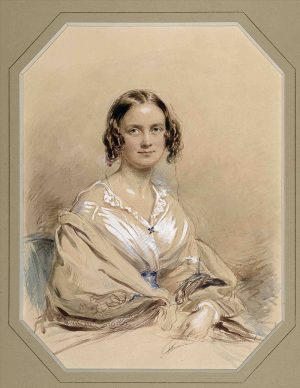Charles Robert Darwin was the proponent of the scientific theory of evolution by natural selection. He was a naturalist who forwarded the idea that animals and humans were descendants of common ancestry. While his ideas were controversial, his contributions to evolutionary science continue to be studied at present. Another contentious aspect of Darwin’s life surrounds his choice of a partner: his first cousin Emma Wedgwood.
Emma Wedgwood Darwin was born to Josiah Wedgwood II and Bessy Allen; she was the youngest in her family. Josiah was an esteemed pottery maker in his time, instilling in his family a Unitarian religion. They lived at Maer Hall in rural Staffordshire, not too far from Josiah’s manufacturing factory. Emma was related to Charles through her father, whose sister, Susannah, was Charles’ mother. Both families enjoyed spending time with each other, and Charles saw Josiah as another father figure due to his mother’s death when he was eight years old.
Charles spent a year in London in his adulthood, at the age of 28. He then needed to decide whether to marry or not. He liked the idea of sitting with his wife on the sofa— this became the reason he chose to find a lover, and he chose his childhood friend and cousin. The two were engaged for three months and then wed in January of 1839. They rented a home on Gower Street in London and had their first child at the end of that year: William Erasmus Darwin. The following year Anne Elizabeth Darwin was born. Charles then purchased Down House in Kent, and the family lived there from then on. Mrs. Darwin had an active social life in her community near Down House, attending to several civic duties. She helped at a lending library for children and a reading room for adults.
Emma and Charles had eight more children: Mary, Henrietta Emma, George Howard, Elizabeth, Francis, Leonard, Horace, and Charles Waring. The first and the last child both died while they were still babies. Anne also passed away in childhood at the age of 10.
As a wife, Emma was supportive of her husband and his academic duties. She often transcribed information that Charles asked her to, reading and translating for him in Italian, German, and French. Emma was alert to any news coverage regarding Charles and observed him for any health problems. Her love for her husband is preserved in the numerous letters she left behind detailing her thoughts while the two were apart on some occasions. Some are found in the Cambridge University Library. As a hostess, she conversed with her husband’s guests, who often spoke of scientific discoveries and news. Other than that, she was a homemaker who also enjoyed planning holiday trips for the family.
When Charles died on April 19, 1882, Emma stayed at both Down House and at a house she purchased in Cambridge. Some of her children still lived with her: Elizabeth, Francis, George, and Horace.
